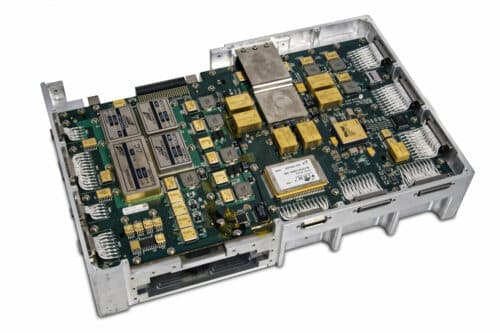Hardware from Alpha Data powers NASA instrument deployed in space to study the heating and cooling of Earth, and the role mineral dust plays in that cycle

Decades ago, it took almost 10 minutes to receive a single spectrum from a geological sample in the laboratory. To improve performance and speed, Alpha Data partnered with NASA’s Jet Propulsion Laboratory (JPL) and has developed high-performance FPIE-D hardware that supports EMIT’s imaging spectrometer to measure 300,000 spectra per second, with superior quality. Alpha Data’s development of EMIT’s FPIE-D board, in conjunction with the Jet Propulsion Laboratory (JPL), correct designs, and mercury systems, required extensive original Research & Development which the company says will be transferable to future projects requiring space-proved data acquisition, cloud-screening, compression, storage, and downlink systems. EMIT was installed on the International Space Station’s truss (ISS).
EMIT is focused on mapping the mineral dust composition of Earth’s arid regions to better understand how dust affects climate heating and cooling. The instrument works by measuring the hundreds of wavelengths of light reflected from materials on Earth. Different substances reflect different wavelengths of light, producing a kind of spectral fingerprint that, when collected by an imaging spectrometer and analyzed by researchers, reveals what they are made of.
The FPIE-D hardware was designed and its manufacture was managed by Alpha Data Inc in Littleton, Colorado, while the software and firmware that runs and configures the Adaptive SoC FPGA (System-on-a-Chip Field-Programmable Gate Array)-based system was developed by Alpha Data specialists at its headquarters in Edinburgh, Scotland. The EMIT FPIE-D board design is based on a standard Alpha Data COTS (Commercial Off-The-Shelf) Zynq7100 board in an XMC form factor. The COTS board was re-spun to make it suitable for space (replacing components with space grade equivalents where needed) and to add features needed for the EMIT mission that was not available on the COTS product.
“The data we’re getting from EMIT will give us more insight into the heating and cooling of Earth, and the role mineral dust plays in that cycle. It’s promising to see the amount of data we’re getting from the mission in such a short time,” said Kate Calvin, NASA’s chief scientist, and senior climate advisor
EMIT will gather billions of new spectroscopic measurements across six continents, closing this gap in knowledge and advancing climate science. “With this exceptional performance, we are on track to comprehensively map the minerals of Earth’s arid regions – about 25% of the Earth’s land surface – in less than a year and achieve our climate science objectives,” Green said.
David Miller, Managing Director at Alpha Data, adds that “the successful deployment of EMIT is a landmark achievement for Alpha Data and further strengthens its historic relationship with NASA JPL.”






